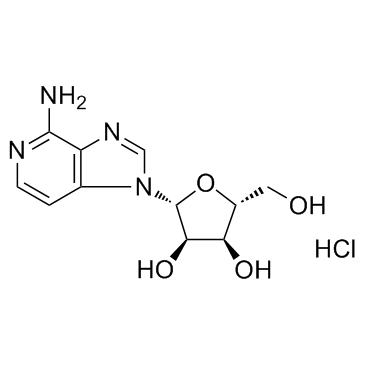| Description |
3-Deazaadenosine (hydrochloride) is an inhibitor of S-adenosylhomocysteine hydrolase, with a Ki of 3.9 µM; 3-Deazaadenosine has anti-inflammatory, anti-proliferative and anti-HIV activity.
|
| Related Catalog |
|
| Target |
IC50: 0.15 (HIV-1, A012 isolate), 0.20 µM (HIV-1, A018 isolate)[1] Ki: 3.9 µM (S-adenosylhomocysteine hydrolase)[1]
|
| In Vitro |
3-Deazaadenosine is an inhibitor of S-adenosylhomocysteine hydrolase, with a Ki of 3.9 µM. 3-Deazaadenosine shows anti-HIV effect, and inhibits p24 antigen in peripheral blood mononuclear (PBMCs) cells infected with HIV-1 isolates (A012 and A018) with IC50s of 0.15 and 0.20 µM, respectively[1]. 3-Deazaadenosine (1-100 µM) inhibits LPS-induced expression of TNF-α mRNA, increases DNA binding activity of NF-κB, and causes proteolytic degradation of IκBα, but Not IκBβ in RAW 264.7 cells. 3-Deazaadenosine (100 µM) enhances nuclear translocation of NF-κB, but blocks LPS-induced NF-κB transcriptional activity, and such inhibition is augmented by the addition of homocysteine[2]. 3-Deazaadenosine (50, 100 µM) dose-dependently inhibits the phosphorylation of Raf and ERK, protein-dependent kinase 1, protein kinase B (Akt), and forkhead transcription factor FoxO1a. 3-Deazaadenosine (50 µM) suppresses vascular smooth muscle cell (VSMC) proliferation via interfering with Ras signaling[3].
|
| Cell Assay |
The HIV-1 strains A012 and A018 are used in the assay. Inhibition of p24 antigen is measured. Briefly, PHA-stimulated peripheral blood mononuclear (PBMCs) are incubated with either HIV-1 strain for 1 h at 37°C at 200-fold the 50% tissue culture infectious dose (TCID50) of the virus stock per 2 × 105 PBMC cells. The TCID50 is defined as the amount of virus stock at which 50% of the inoculated wells are positive. Cells are then grown in microtiter plates with different drug concentrations at 2 × 105 cells per well. On day 4, cells are resuspended and split 1:3 with fresh media and 3-Deazaadenosine. Supernatant p24 antigen is determined on day 7 by ELISA[1].
|
| References |
[1]. Gordon RK, et al. Anti-HIV-1 activity of 3-deaza-adenosine analogs. Inhibition of S-adenosylhomocysteine hydrolase and nucleotide congeners. Eur J Biochem. 2003 Sep;270(17):3507-17. [2]. Jeong SY, et al. 3-deazaadenosine, a S-adenosylhomocysteine hydrolase inhibitor, has dual effects on NF-kappaB regulation. Inhibition of NF-kappaB transcriptional activity and promotion of IkappaBalpha degradation. J Biol Chem. 1999 Jul 2;274(27):18981-8. [3]. Sedding DG, et al. 3-Deazaadenosine prevents smooth muscle cell proliferation and neointima formation by interfering with Ras signaling. Circ Res. 2009 May 22;104(10):1192-200.
|
